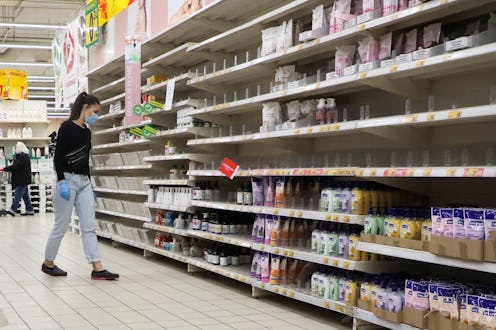Life
What To Know Before You Go To The Pharmacy For Birth Control, Antidepressants, & More

As people around the world begin to practice social distancing to prevent the transmission of COVID-19, movie theaters, bars, and all other non-essential businesses are closing. Like grocery stores, pharmacies are typically exempt from these bans since they provide an essential service. Still, it's fair to worry about if it's safe to go to the pharmacy during the coronavirus outbreak.
"As we’ve seen around the world, all non-essential establishments are temporarily closed in order to help slow the spread of COVID-19. Healthcare establishments, including pharmacies, are usually an exception," Dr. Jessica Nouhavandi, Pharm.D., lead pharmacist and CEO of accredited online pharmacy Honeybee Health tells Bustle.
Is It Safe To Go To The Pharmacy During The Coronavirus Outbreak?
Just because it's open doesn't mean you should go for social interaction, though. "While pharmacies technically might remain open, with the current rate at which the virus is spreading, we urge everyone to stay home as much as possible," Nouhavandi tells Bustle. She notes that this is particularly important for elderly and immunocompromised people, and anybody with a chronic condition of any kind. "If this is you, I strongly recommend that you use an online pharmacy to deliver your medications directly to your door." In addition to Honeybee Health, pharmacies like RiteAid and CVS offer free prescription delivery in some areas, as do startups like Capsule and Nurx. Talk to your local neighborhood pharmacy about whether they're planning to offer delivery; if they're a small business, now is a good time to support them.
Part of the reason that coronavirus has spread so quickly is that carriers can be asymptomatic — and that research now shows that people may be most contagious in the early stages of the virus, sometimes without any symptoms. If you have the option, it seems like a good idea to stay home and opt for delivery instead.
Popping to the pharmacy because you want hand sanitizer also isn't necessary, experts tell Bustle. We know that hand-washing and hygiene are essential to slowing the spread of coronavirus, but hand sanitizers aren't the most efficient way of doing it. "If the world is out of hand sanitizer, remember, soap and water work just as well," Dr. Larry Burchett, M.D., tells Bustle. A hand sanitizer needs to be at least 60% alcohol to be effective, but soap and water have no such requirements. At least 20 seconds of soaping thoroughly to the rhythm of your favorite song, plus a thorough drying-off afterwards, is all you need. Face masks, too, should be reserved for medical professionals.
How To Get Birth Control & Antidepressants Delivered During The Coronavirus Outbreak
If you have medication you take regularly and need a refill, now's not the time to disrupt your schedule. "Birth control and antidepressants should absolutely be continued without disruption during this time. However, I still do not recommend going in-person to a pharmacy to pick them up," Nouhavandi says. "Online pharmacies should be the go-to."
Nouhavandi recommends getting a 90-day refill of any prescription medications taken frequently, including birth control and antidepressants. This is especially essential given medication production might be disrupted by quarantines.
If your insurance or typical pharmacy have quantity limits on how much of your medication you can get at one time, or where you can get the medication from, Nouhavandi suggests going to a pharmacy that sells medication at the cash price, if it works out as cheaper than your insurance copay. Online pharmacies may also have quantity limits, so always check the fine print.
You can also go online for pads, tampons, and other things that can be purchased easily — or now could be the time to try out period underwear or menstrual cups that will cost you less in the long run.
Your friendly local pharmacy will likely stay open while the coronavirus keeps many other businesses shut, but experts advise not visiting in person unless you absolutely have to.
Experts:
Dr. Larry Burchett, M.D., family physician
Dr. Jessica Nouhavandi, Pharma.D., CEO of Honeybee Health
This article was originally published on